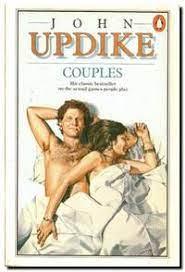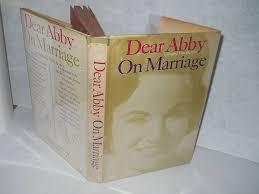
Couples was a 1968 John Updike novel. I loved his writing, but it took me ages to finish Couples. It was about sex, and I was in my early twenties, sexually clueless. But rather than being titillating, the narrative was repellent, so I kept putting it aside. It involved a bunch of “swinging” couples. Didn’t seem like they were actually having fun. A real icky downer in fact.
I read the advice columns in my local paper, part of my lifelong effort to understand people. “Dear Abby” often responds inanely — “Tell your husband just what you wrote in your letter.” Thanks a lot. Carolyn Hax is far better, with really meaty replies. Both columns, naturally, often feature marital problems. Of course people who write in are not a representative sample of the population; but still, it seems such situations are pretty common.

A recent “Dear Abby” correspondent related being thrown for a loop when her husband of 30 years suddenly asked for a divorce, moved out, and then in with another woman. She said she still loved him. Abby advised her to recognize he “isn’t the person you thought he was.”
After three decades? You’d imagine they’d know each other fairly well. And indeed, many of these letters involve long-standing dysfunctionality the writers do know all too well. Reading these accounts, I’m often asking myself — why is she still staying with this guy?
As if I’m one to talk. I stayed in a troubled relationship for ten years. Believing I could fix it (being the great optimist). Then came failed efforts to extricate myself. It wasn’t so simple. Finally she extricated herself.

Afterwards I did luck into a great marriage, about which I recently wrote. I commented about how much that enhances happiness, and how short-sighted it is to indulge in stuff that undermines a marriage. These advice columns offer a window into all such human imperfections.
A big, endemic one involves alcoholism and drug abuse, which wreak havoc on one’s functionality, behavior, and consequently one’s relationships. Another is the controlling personality type, the “my way or the highway” syndrome. That’s an aspect of just plain self-centeredness — people feeling entitled to gratify their own wishes even at the other’s expense. Reducing the other person to a tool rather than a partner. Fine, maybe, if the other person is happy to be used, but that rarely works out.

My own rule is to always say yes to my wife unless there’s a big reason not to.
My humanism, and experience of humankind, tells me most people are good at heart. But unfortunately some are not, and they do boundless harm. And unfortunately they seem to exert a bizarre sexual attraction — the “bad boy” syndrome. Another thing I keep asking myself, reading those advice columns, is why did you hook up with that person in the first place?
Adultery is the most blatant sure-fire marriage killer. Obviously sexual desire drives much human behavior, and an illicit affair can impart excitement into an otherwise dreary existence. Yet still, it seems the price one pays is so disproportionate to the rewards. And here again, so often the paramour is not exactly a paragon of virtue. Why fall for such a person?
Maybe I’m too rational. I’ve never been tempted because women have never come on to me.

But then, why is sexual infidelity such a marriage breaker? Sure, betraying one’s loyalty to a partner is a big deal. But does adultery necessarily constitute that kind of betrayal? Recognizing, again, the libido factor, and the excitement factor, being ubiquitous aspects of the human make-up, failing to resist them is so normal a weakness that perhaps a partner should be forgiving, seeing such behavior as not truly inconsistent with a loving bond? If the spouse comes back after their fling? Why does sticking a penis into someone else’s orifice have to mean so very much? Marriage, after all, is about so much more than sex!
But another aspect is that much adultery also involves an emotional entanglement, which can seem antithetical to one’s spousal bond. However, we form all sorts of bonds with other people that don’t necessarily entail any sort of marriage betrayal. Must it be a given that engendering an emotive relationship with another person comes at the expense of one’s primary partner? Are we really that limited in our repertoire of human relations?
Still and all, infidelity is playing with fire, and not a good idea if you value your marriage.

I find it hard to gauge how common it really is. Commensurate with how large it looms in the cultural consciousness? My wife and I socialize with a bunch of couples, all of whom seem to have great relationships (some, like me, after prior unsuccessful ones). Providing a strong counterpoint to all the marital dysfunction appearing in those advice columns, and in popular culture. Significantly, none of us are drinkers. And we’re all around seventy or older.
Scant fodder there for an Updike.
